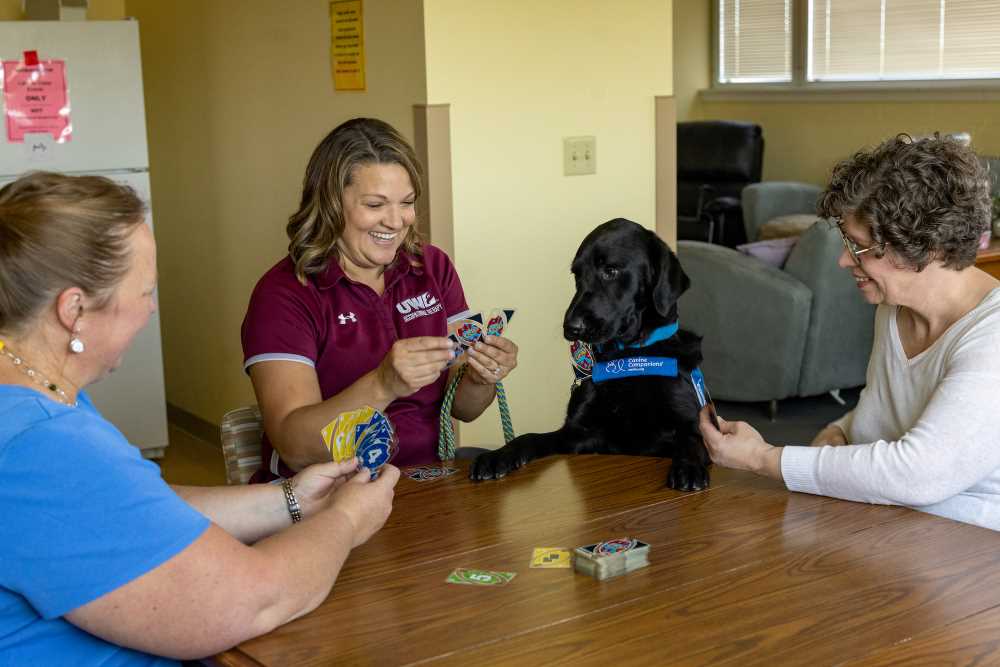Motivation and support come in many forms, including a cold nose and a warm heart. The UW-La Crosse Health Science Interprofessional Research Center recently welcomed its newest staff member: Canine Companions Facility Dog Rossi.
Rossi is a smart dog and the first canine to become part of UW-La Crosse classrooms — specifically clinical classrooms where future occupational therapists, physical therapists, recreational therapists and others are learning how to incorporate service dogs into therapy.
“In their future careers, these students will be working with service dogs, so they need to know about the ability of service dogs and general care commands to better support their clients,” explains Jenn Taylor, UWL assistant professor of Recreational Therapy. “And if they are working with someone with a newly-acquired disability, they will be able to say, ‘here is what a service dog could do for you.’”
Rossi is part of the new Dr. Wags program at UW-La Crosse that is launching this fall. The program aims to grow and provide facility service dog training on campus for future professionals who will work with clients who have them. The Dr. Wags collaboration is part of the Health Science Interprofessional Research Center, a collaboration between the departments of Occupational Therapy, Physical Therapy, Recreational Therapy and Exercise and Sport Science to do applied research.
Rossi comes from Canine Companions, a national organization that enhances the lives of people with disabilities by providing highly-trained service dogs at no charge to the recipient. For over 45 years, Canine Companions has been enhancing the lives of people with disabilities by training and placing more than 7,000 service dogs with program graduates, including more than 350 dogs with military veterans and more than 2,000 dogs with children. The estimated cost of a highly-trained Canine Companions facility dog like Rossi, and all follow up support, is $50,000, however each facility dog is provided at no cost. Canine Companions depends on the support of tens of thousands of donors and volunteers to match facilities with service dogs like Rossi entirely free of charge. In addition to facility dogs, individuals with disabilities can apply to receive a service dog for free through the organization.
Rossi has been expertly matched to UWL to meet goals with students and the clients they serve. He can pull wagons and open refrigerators as well as perform complex tasks such as helping a client put on a shoe, do laundry, or assist clients as they play any number of games such as frisbee or ring toss.
With Rossi being the first service dog in the UW System, the process of establishing the program on campus hasn’t been simple, notes Taylor. Many steps exist for working with animals at universities from Institutional Animal Care and Use Committee (IACUC) approval to risk management considerations. However, she says people across campus have pitched in to help with each step, including a group of UWL students in the HSIRC who researched service dog programs on other university campuses.
The idea of bringing a service dog to campus came from Laura Schaffer, program director for UWL’s Occupational Therapy program. Schaffer and Tara DeLong, associate teaching professor in Recreational Therapy, completed specialized training to be Rossi’s handlers, and they will be the only individuals to give commands to Rossi whether in classes or at community outings.
“I love that this is a project that brought health science disciplines together. We can use the dog in different ways depending on the type of therapy we are doing,” notes Taylor. “Still we all have common goals in incorporating service dogs. It all comes back to quality of life and care for the client.”
Written by UW-La Crosse
Link to original story: https://www.uwlax.edu/news/posts/dr-wags/

